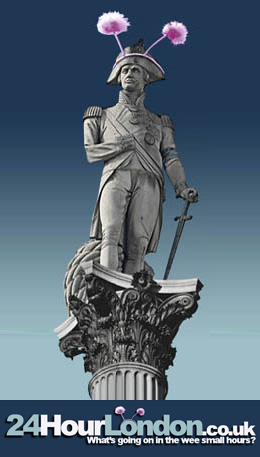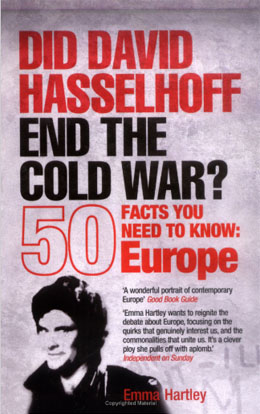It rustled in the William Morris undergrowth of my background. I've had three grandparents – one with us still – who were active in Labour politics and who between them had a collection of Labour movement pamphlets dating back many decades. From childhood I met words like "socialist" (which meant being nice to people, according to mum) and "Fabian" (those who believe in inflicting socialism on the working class because it's good for them, I gathered, unable to tell whether this was a joke. It was – but only a good one because of the truth buried in it). The words' competing nuances came to life around the family dinner table, especially with my grandparents after we moved to Norwich. The city was a bright red dot in a blue sea on election night, mainly as a result of the university based there, and until I moved away after school I was under the misapprehension that "Tory" was a term of abuse, not knowing that they also referred to themselves in this way. This makes me smile now.
As an undergraduate I worked for Harriet Harman as a researcher for a few months: months that I seemed to spend mainly retracing Harriet's movements, trying to find the spot where she had most recently abandoned her handbag.
One of my most treasured memories of my course at Leeds is of finding a first edition of William Morris's A Dream of John Ball in the stack under the Brotherton Library and realising that I knew it and its beautiful illustrations (see above) even though I'd never seen it before.
What I am trying to say is that Labour politics is my hinterland. And that hinterland is a dimension of this country that coexists spectrally, a misty gauze of hope and expectation that lies over the landscape, as much a part of Britain as the version of it familiar to bankers and property developers – more permanent because the need for it is greater.
And Sydney Carter's song John Ball is the motherlode of English revolutionary politics in folk music, it seems to me.
It kicks in after about eight minutes: my favourite version of the song so far, by The Old Dance School. At the Warwick folk festival in 2013 the song's harmonies rang in my ears in the beer tent for the best part of three evenings and I saw The Old Dance School play their powerfully ecstatic version of it more than once. I assumed to begin with that it was a traditional song because the lyrics seemed smoothed by time and their meaning evoked religion through the lens of ethical socialism. There were lots of versions...
It wasn't traditional though.
What it is, is a story about John Ball, the hedgerow preacher who inspired the peasant's revolt in the 14th century, the ex-communicated priest who told his congregation that "Now is the time" in such a way that many of them laid down their lives alongside him and Wat Tyler. His revolutionary, proto-socialist ideas lived on after his death at the hands of Richard II and can be traced forward to the nonconformism of the civil war and from there to the new world. In a nutshell
"Labour and spin for the fellowship you're in. Labour and spin for the love of one another. When Adam delved and Eve span who was then the gentleman?"
Work for the dignity it gives you and to support those whom you love, and never forget where we all came from – and where ultimately we're all going. When The Old Dance School plays John Ball, a part of me would like to sing it with them but another chokes and wells up with emotion, making it impossible. It makes me feel a little foolish but there you go.
But far from being a traditional piece, the song was written by Sydney Carter – who is probably best known for also having written Lord of the Dance – and John Ball was written in the 1960s and recorded for the first time, I believe, by John Kirkpatrick and Sydney Carter in 1981 on the album Lovely in the Dance.
Sydney Carter died in 2004 after a long and eventful life. But, probably because I learned my politics from my forebears, it made sense to me to ask what kind of a man he was of his only son, Mike Carter, who is a consultant paediatric neurosurgeon in Bristol these days.
When I Googled Dr Carter there was a lot about parking fines at his NHS hospital trust: it seems that the same non-conformism that led his father to write so many songs that found their way into my hymn book at school – If I needed a neighbour and One more step among them – had led the son to be the kind of person who does not mind making some waves.
"It was a very corporate-minded trust that expected us to work on two sites but made no provision for parking," he explained when I caught up with him. "Eventually Jeremy Hunt announced that they had changed their tack."
Perhaps inevitably Carter is also a part-time musician, a multi-instrumentalist with Peter Mouse's House Band, which seems to do a lot of weddings and revels in the accolade of being Bristol's second-favourite covers band. "I knew the story of John Ball as I was growing up – I heard it from dad. And then we sang a lot of dad's songs at school. Mum was a teacher at Bessemer Grange Primary in Dulwich and even though the repertoire of dad's stuff is usually to be found in schools, ours was much greater than usual.
"John Ball was a preacher who was excommunicated for his anti-church views. He felt one should be living the life of Christ and that those who had everything and did not share it were not living the life of Christ. And he felt that the church at the time was supporting the rich and not the poor. This was at a time when the discrepancy between the lives of the rich and the lives of the poor was at its greatest ever. The Hundred Years War against France was going on and it was incredibly difficult to finance. There were three poll taxes – which were regarded as a terrible injustice by many people. This was a time, you see, when many were born into servitude and had no prospect of getting out of it.
"So in a way what John Ball was preaching was a form of liberation theology, of the kind that Cardinal Romero used to espouse in Latin America and a little bit like the present pope, who gets rid of all his riches and walks around in the streets of Rome." But there was very little precedent for it back then.
Carter said that he deals with his father's estate and the royalties due to it. "John Ball seems to be coming up more frequently all the time – it's great that it's been picked up by contemporary performers." The first version Carter mentioned was Chris Wood's, though he seems to hold a candle especially for one by Wood and Karine Polwart, which I can't seem to find on the web.
He also mentioned Crow on the Cradle, which is performed by Show of Hands.
And then wondered out loud whether they had picked it up from Jackson Browne, who sang it at Madison Square Gardens in 1969, after which it appeared on his live album.
"Dad and I were incredibly close. He was extraordinarily kind, incredibly intelligent: a polymath. He knew everything about everything, it seemed to me as a child, and came from a very humble background himself: he got to Balliol through a series of scholarships. He was very influenced by Quakerism but I'm not sure he would call himself a Quaker. He didn't think you should respond to authority unless it was in the right and that established religion was too didactic... A lot of his beliefs are my beliefs. I was brought up to call things if they were wrong."
Thoughtfully, Mike also provided this family snapshot, which includes his mum, Leela: he was an only child and this was, essentially, the fellowship they were in.
* If you enjoyed this post you might also enjoy this one, about folk music in Afghanistan. Or this one, which is about why the Germans have such a difficult relationship with their music.
* If you'd like to receive posts from this blog directly into your Facebook newsfeed, you could *like* its Facebook page and then use the drop-down menu to indicate that it's one of your "interests". This will enhance the possibility that you'll get them. You could also follow me on Twitter at @emma1hartley






Great educational read and I loved the opening of 'Sometimes looking at David Cameron's gammony face'...Interestingly I also grew up in a labour/socialist environment on a council estate and from a young age I thought it must be the most shameful thing in the world to be a Tory...At 43 I still believe that now...Sometimes even more so!
ReplyDeleteescort in kolkata
ReplyDeleteescorts in kolkata
hot call girls in kolkata
kolkata best escort
kolkata best escorts
hi profile escort girls in kolkata
kolkata hotel escorts
kolkata call girls services
near by call girl
kolkata bengali escorts
kolkata housewife escorts
housewife escorts in kolkata
park street escorts
park street call girls
park treet near escort girls